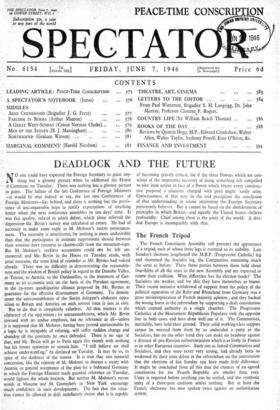The French Tripod
The French Constituent Assembly still presents the appearance of a tripod, each of whose three legs is essential to its stability. Last Sunday's elections lengthened the M.R.P. (Progressive Catholic) leg and shortened the Socialist leg, the Communists remaining much the same as before. These three parties between them hold about
four-fifths of all the seats in the new Assembly and are expected to renew their coalition. What difference has the election made? The Socialists are weaker, and for this they have themselves to blame. Their recent tentative withdrawal of support from the policy of the political separation of the Ruhr and Rhineland from Germany was a gross misinterpretation of French majority opinion ; and they backed the wrong horse at the referendum by supporting a draft constitution which centred authority in a single chamber. The Progressive Catholics of the Mouvement Republicain Populaire took the opposite line in both cases and have done well out of it. The Communists, inevitably, have held their ground. Their solid working-class support cannot be wrested from them by so undecided a party as the Socialists, but on the other hand they can make no headway against a distrust of pro-Russian authoritarianism which is as lively in France as in other European countries. Such ties as linked Communists and Socialists, and they were never very strong, had already been so weakened by their joint defeat at the referendum on the constitution that the elections of last Sunday can have made little difference. It might be concluded from all this that the chances of an agreed constitution • for the Fourth Republic are smaller than ever. Unity is required before anything can be settled, and the synthetic unity of a three-part coalition settles nothing. But at least the French electorate has now spoken twice against an authoritarian system.


























